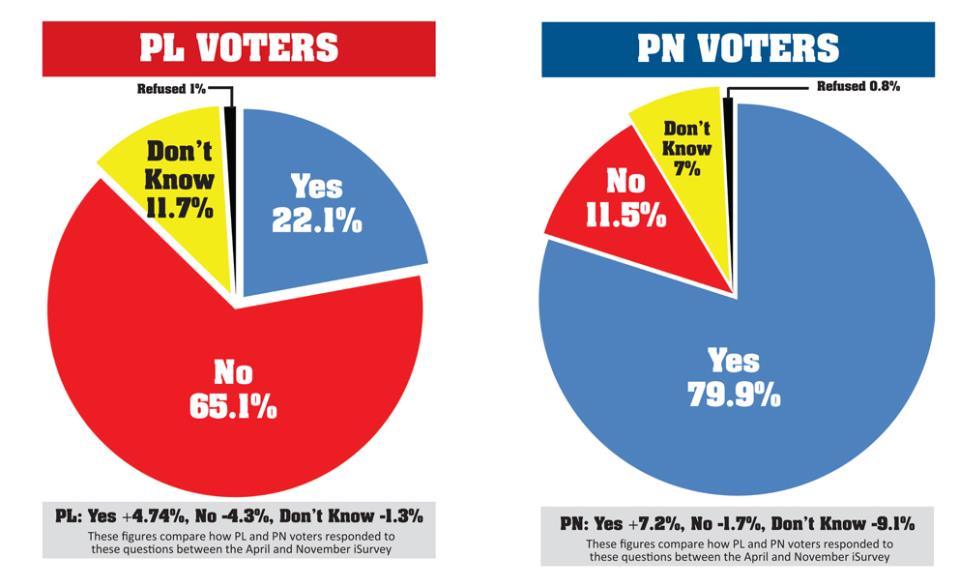Nearly half of respondents, 47 %, believe that the government is corrupt, according to the November edition of the iSurvey commissioned by The Malta Independent.
Respondents were asked a straightforward question: Do you think the government is corrupt? Overall, 47.02% believe so, 37.83% reject this notion, 13.45% are undecided while 1.64% refused to answer the question.
The Opposition has carried out an ongoing campaign against corruption, making it top of
the agenda when criticising the government.

The government's last three and a half years have been characterised by two main features: Strong economic success and an unusually high number of scandals.
Malta, over the last three and a half years, has experienced the lowest levels of unemployment in its history, fast paced economic growth, is nearing a balanced government budget, has made some major improvements in the public health sector and has attracted some major investments.
For a proportion of the electorate however, this has been overshadowed by the controversial €3 million government expropriation deal on a property of Old Mint Street known as the 'Gaffarena scandal, the €4 million Cafe Premier deal, the Australia Hall saga, the ICIJ's revelations of the Panama Papers scandal - heavily implicating no-portfolio minister Konrad Mizzi and the Prime Minister's chief of staff Keith Schembri and the building of an American University of Malta in an Outside Development Zone at Żonqor.
The hedging agreement between Enemalta and Azerbaijani energy company SOCAR had also made headlines, after a National Audit Office report found that the ill-timed hedging saw Maltese taxpayers lose out €14 million. Accusations of corruption stemmed from the degree of ministerial interference by no-portfolio minister Konrad Mizzi, which he heavily denies. The public was unable to determine the degree of interference due to a lack of documentation.
In addition to this, the Libyan medical visa scandal where it was alleged that former health ministry worker Neville Gafa took bribes in exchange of issuing such visas, the Algerian visa scandal where it was found that roughly 7,000 visas were issued to Algerian nationals in the space of 18 months and lastly the Individual Investment Programme where it was found that a number of persons who applied under this scheme were given the right to vote in breach of Malta's Constitutional requirements.

Spread of PL and PN voters
Unsurprisingly, when breaking down the results based on how respondents voted in the last general election (2013), 22.1% of Labour Party voters believe the government is corrupt, 65.1% disagree, 11.7 were unable to answer and the remaining 1% refused.
When comparing the way PL voters answered this question during the April 2016 iSurvey, it was found that the proportion of such voters who believe their government is corrupt has risen by 4.74% (17.4% in April to 22.1% in November), the proportion who disagree has declined by 4.3% (69.4% in April to 65.1% in November), while the proportion of 'don't knows' has also declined by 1.3%.
On the other side of the political divide, 80% of Nationalist Party voters believe the government is corrupt, 11.5% disagree and 7.7% are undecided. Compared with how PN voters responded to this same question back in April, the proportion of PN voters who believe the government is corrupt went up by 7.2% (from 72.8% to 80%), those who disagree went down by 1.7% (from 11.5% to 9.8%) while those who are undecided went down by a significant 9.1% (from 16.8% to 7.7%).
It would therefore appear that, voters from both sides of Malta's political spectrum are more in agreement than ever before about the levels of corruption found within the government.
When looking at the gender split, more men than woman found the government to be corrupt, at 48.6% and 45.4% respectively. When it comes to the proportion of male and female voters who disagree, the results were almost identical at 37.7% and 37.9% respectively. Females were overall more undecided at 14.4% than their male counterparts, at 12.4%.

Younger people are more likely to find the government to be corrupt, with 51.4% of 18-24 year-olds believing so, followed by 45.7% of those aged 25-34, 40.6% of those aged 35-44, 43.1% of those aged 45-54, 39.6% of those aged 55-64 and lastly 32.8% of those aged 65+. The proportion of the 18-24 year-old cohort who agree that the government is corrupt has gone up from 36.1% to 51.4% between April and November.
Conversely, older cohorts disagree with the notion that the government is corrupt, with 33.3% of those aged between 18-24 disagreeing. This figure increases steadily until reaching the 65+ cohort, 52.9% of which do not believe the government is corrupt.
This tallies with the 59.1% of respondents who believe that the government is corrupt but were ineligible to vote in the last general election, primarily due to not yet reaching 18+. Of this section, a significant 22.7% are still making up their mind on the levels of corruption Malta is currently experiencing.
The November 2016 iSurvey - the sixth of its kind - was commissioned to Business Leaders Malta on behalf of The Malta Independent. A total of 600 respondents were used, representative of age, gender and spread of localities. With such a sample size, the margin of error is +/- 4%. More info from the iSurvey will continue to emerge throughout this week.